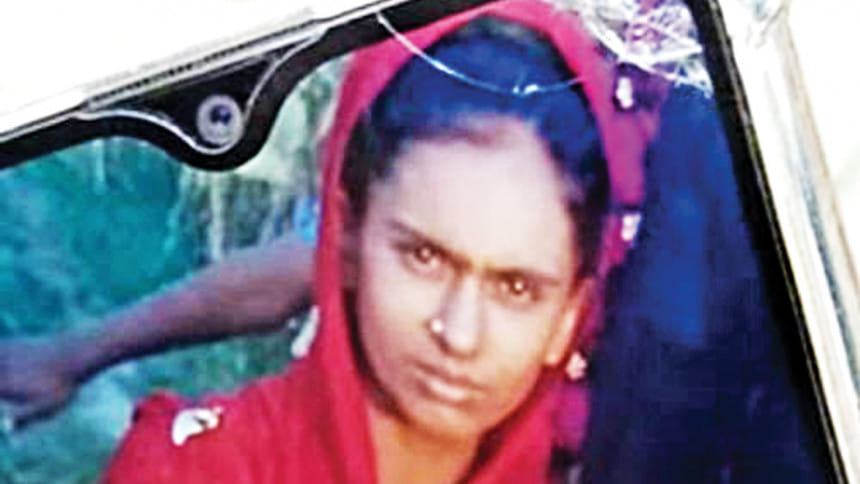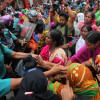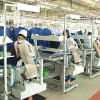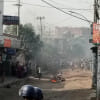Demo for RMG wage hike: Worker shot dead in fresh unrest

A garment worker was shot dead and 30 people were injured in Gazipur as law enforcers opened fire on workers demonstrating for a minimum monthly wage of Tk 23,000, a day after it was fixed at Tk 12,500.
Anjuara Khatun, 28, mother of a seven-year-old girl and an eight-year-old boy, was pronounced dead when she was brought to Dhaka Medical College Hospital. There were pellets in her forehead, around her ears and other parts of her body.
The workers started demonstrating at different places in Gazipur city around 8:30am, according to police and locals.
They started vandalising factories to get workers of those factories to join them, claimed Mahbub Alam, commissioner of Gazipur Metropolitan Police.
The workers threw brick chunks at law enforcers, prompting the latter to use teargas shells, rubber bullets, and sound grenades, he added.
He said two people injured in the clash were taken to Dhaka for treatment and that he did not know whether any of them had died.
The situation turned worse around 4:00pm when the workers blocked the Dhaka-Mymensingh and Dhaka-Tangail highways in Nawjor area and law enforcers, including industrial police, fired teargas shells and rubber bullets, and used sound grenades, he said, adding that the highways were blocked until 6:00pm.
At least 22 injured people took treatment in local hospitals, our correspondent in Gazipur reported.
GMP Commissioner Mahbub told The Daily Star that six policemen were injured after a sound grenade went off inside an armoured personnel carrier (APC).
One of the policemen lost his right hand when the grenade exploded, said Bacchu Mia, in-charge of the Dhaka Medical College Hospital police outpost.
Law enforcers and garment workers clashed in Ashulia around 2:45pm when hundreds of workers tried to demonstrate on Bypail-Abdullahpur road.
Police fired shots in the air and teargas shells, our Savar correspondent reports, adding that police also charged truncheons.
A FIGHTER'S LIFE ENDS
Sewing machine operator Anjuara Khatun, 28, of Islam Garments in Gazipur was declared dead on arrival at the Dhaka Medical College Hospital around 12:15pm, according to hospital records.
Morgue sources told The Daily Star that there were shotgun pellets on her forehead, arm, and back.
Her husband Jamal Badsha, also a garment factory worker, told The Daily Star that around 7:30am Anjuara went to the factory which is near their home in Konabari. Around 8:10am, the factory authorities announced over loudspeakers that the factory was closed due to the protests.
"After 20-25 minutes, I heard gunshots in front of another factory in the Char Rastar Mor area. Then I saw people carrying my injured wife on a rickshaw van," he said while waiting in front of Dhaka Medical College morgue.
"She was motionless. I saw blood oozing out of small holes on her head," he said.
She was first taken to a hospital in Konabari which referred her to the DMCH, he said, adding that Anjuara died on the way.
Anjuara and Jamal got married 10 years ago and have been fighting to have a decent livelihood since then.
Jamal said they worked at garment factories in Gazipur for five years after marriage. But when Jamal contracted TB, the couple moved to their village in Kazipara upazila of Sirajganj.
"I could not work for two years. We incurred a debt of Tk 3 lakh. Then we returned to Gazipur to work and repay the debt," Jamal said, adding that they have been struggling to cope with the rising prices in recent months.
"We earned around Tk 21,000 together, but it was not enough. My wife was always worried about the debt. At home, she always said that we both worked hard but were still struggling to lead a decent life due to the measly wage. She supported the recent movement for salary hike," Jamal said.
They could not afford to keep their children with them. Their eight-year-old son and seven-year-old daughter go to a school in their village.
The children came to visit their parents and could not go back to Sirajganj due to the blockade.
"Anjuara was supposed to take them back to Sirajganj on Friday [tomorrow]. But she has now gone forever," Jamal said in tears.
Jamal demanded a fair investigation into the death and punishment of the responsible.
Apprehending labour unrest over pay hike, 48 platoons of Border Guard Bangladesh were deployed yesterday morning in Dhaka and nearby districts to ensure security at garment factories. Industrial police and Rab members were also deployed.
The workers had demonstrated for 12 straight days before suspending demos following assurances. The current starting wage is Tk 8,000.
Union leaders have rejected the new wage and threatened to go for tough demonstrations.
Over the last two weeks, workers demonstrating for a minimum wage of Tk 23,000 clashed with law enforcers in Gazipur, Savar, and Dhaka's Mirpur.
On October 30, a garment worker was killed after Gazipur Industrial Police personnel allegedly shot him from close range. During the clashes, firefighters recovered the charred body of an unidentified man from ABM Fashion factory where a fire broke out.
Demanding a starting salary of Tk 25,000, Montu Ghosh, president of Garment Sramik Trade Union Kendra, said the measly amount set was not enough to lead a good life. Inflation and high prices of essentials have made things worse for garment workers.
Nazma Akter, president of Sammilito Garment Sramik Federation, said the new wage is well below the workers' expectations. An acceptable wage should be fixed.
Rights organisation Ain o Salish Kendra in a statement yesterday said police firing on unarmed garment workers is undesirable and unacceptable.
It is the responsibility of the state to determine the wages of garment workers and improve their quality of life, it said.
Meanwhile, the Bangladesh Garment Manufacturers and Exporters Association (BGMEA) yesterday urged workers to return to work and said the new wage structure would be implemented from December 1.
It said the owners may shut down the factories if the workers do not return.
BGMEA President Faruque Hassan in the statement said workers' demonstration after the announcement of the new wage was unexpected.

 For all latest news, follow The Daily Star's Google News channel.
For all latest news, follow The Daily Star's Google News channel. 







Comments